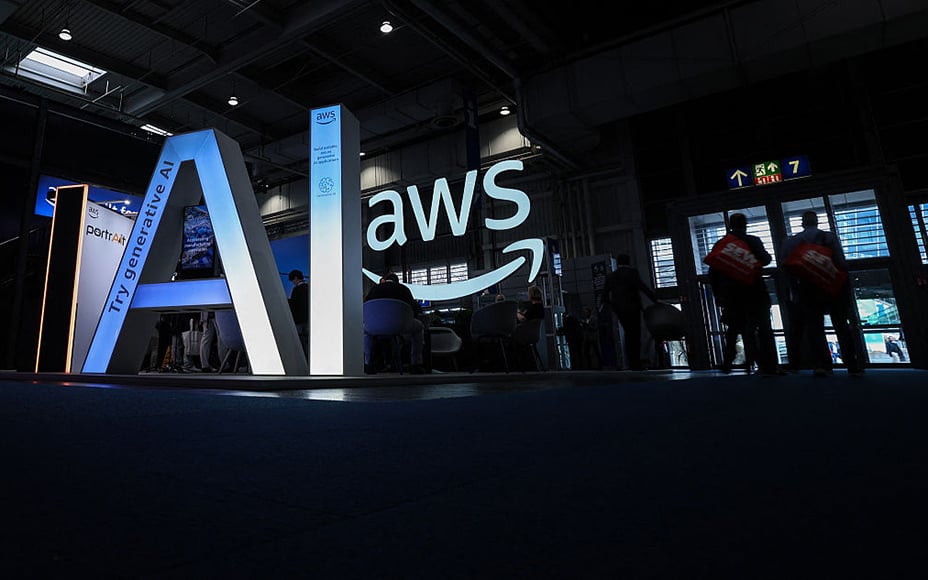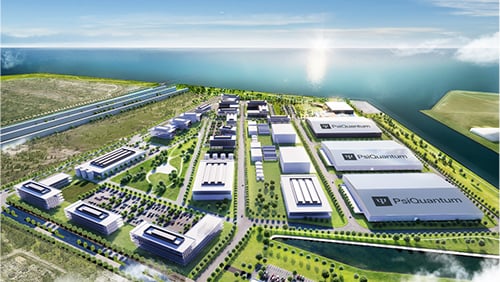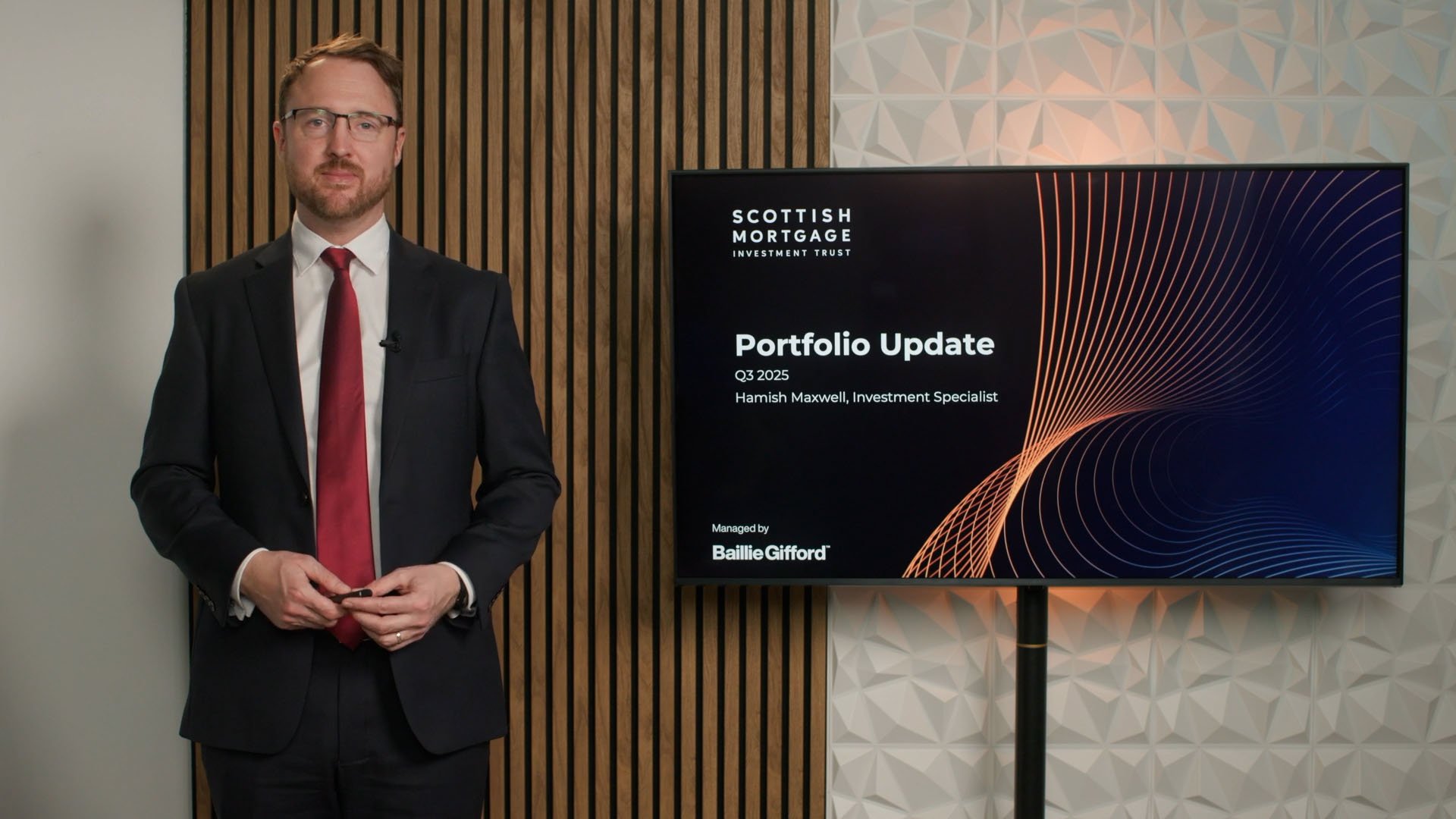Tom Slater: Manager Review
Tom Slater – Manager, Scottish Mortgage
- Generative AI is reshaping industries, with NVIDIA and Meta leading in efficiency and innovation
- MercadoLibre and Nubank showcase growth in digital financial services
- Amazon and Shopify exemplify adaptability, leveraging AI to enhance core strengths
As with any investment your capital is at risk.
The year just passed has been one of compounding progress despite a disorientating backdrop. Markets remain volatile. Interest rates are high, confidence remains fragile, and economic uncertainty endures. But beneath the surface noise, the companies we back have, in many cases, delivered quietly impressive operational results. They have grown more resilient, more disciplined, and in several cases, more profitable.
This wasn’t inevitable. Two years ago, many of the businesses we own faced sharply higher funding costs and less forgiving public markets. The most ambitious took those signals seriously. They cut back on headcount growth, refocused on their core strengths, and made the kind of long-term decisions that only become obvious in hindsight.
As the environment has stabilised, these companies are emerging stronger. Margins have widened. Free cash flow has accelerated. Many of the themes we’ve followed for a decade such as digital platforms, AI, electrification and personalised medicine are translating into tangible results.
The Rise of AI and the Shifting Shape of Value
Few developments this year were more consequential than the rise of generative AI. The conversation has moved quickly from theory to practice. We see its impact most clearly in software engineering, where productivity is already rising dramatically.
This matters because software sits at the core of the modern economy, and many of our companies are already putting these gains to work. Several have increased output without increasing engineering headcount. Others have launched new products with surprisingly lean teams. AI is not a distant promise. It is driving real operational leverage today.
How should we, as investors, respond to such a powerful, yet hard-to-quantify force? Our largest holding at the start of the year, NVIDIA, sits at the heart of the current AI boom. Its dominance in training large AI models is unmatched.
However, to be truly transformational, we believe AI must become ubiquitous—and that implies commoditisation. A world built on $70,000 chips and 60 per cent margins may not be sustainable. As a result, we chose to reduce our position significantly over the year. This does not reflect diminished respect for the company. It reflects our long-held discipline: we seek asymmetric outcomes. And at the prevailing valuations, the risk/reward looked more balanced than we prefer.

Conversely, we added to companies that will benefit from the broader adoption of AI tools. Meta has rebuilt its business with greater efficiency, while embedding AI more deeply into its product and advertising stack. It has many opportunities to drive its revenue growth today using this technology. Last year the company noted an 8 per cent increase in time spent on Facebook as a result of AI driven content recommendations to its users. The performance of its stock reflected that progress.
Spotify, likewise, is emerging as one of the most efficient scaled platforms in the world using AI to personalise content discovery, improve advertising targeting and, potentially, to create a broader content ecosystem. Both were among the strongest contributors to returns.
We initiated a new position in TSMC, recognising that compute demand will remain structurally strong as AI moves from the training phase to deployment at scale. The appetite for semiconductors across datacentres, vehicles, devices and infrastructure continues to grow. TSMC has solidified its leadership in the global semiconductor foundry market as competitors such as Intel have stumbled.
Resilience as a Strategic Advantage
In an environment defined by unpredictability, resilience is not a secondary virtue; it is central to long-term success. We are increasingly convinced that the companies most likely to endure and thrive are those capable of adapting. This means not just those with strong balance sheets, but with leadership teams willing to evolve, reallocate capital, and make difficult decisions without losing sight of their long-term mission.
This year brought a fresh reminder of how interconnected, and vulnerable, the global system has become. Just after our financial year end, the United States announced sweeping new tariffs on several of its key trading partners. The reaction from markets was immediate and severe.
We are cautious about leaping to conclusions, but we do not view these developments as transitory. The underlying imbalances in the US and global economy whether in trade, debt accumulation, inequality or political cohesion are increasingly unsustainable. As Herbert Stein’s Law famously states, “If something cannot go on forever, it will stop.” It appears the current administration is accelerating that moment of reckoning.
Many of the themes we've followed for a decade such as digital platforms, AI, electrification and personalised medicine are translating into tangible results.
Equity markets offer no hiding places in such a landscape. Few companies will be unaffected by a reordering of the global trading regime. What matters is how they respond.
Our task as investors is to seek out businesses with the adaptability to recalibrate and the cultural foundations to withstand disruption. In this context, resilience becomes not just about enduring shocks but learning from them and emerging stronger.
Several of our portfolio companies exemplify this mindset. Amazon, having invested heavily during the pandemic to expand its fulfilment network, is now reaping the rewards of that decision. It has emerged from a period of cost inflation and operational challenge with a far leaner and more productive infrastructure. Its margins have increased and it has ample cashflow to make the necessary investments for an AI-led future.
Shopify, too, made a conscious shift by offloading capital-intensive logistics infrastructure while refocusing on its core mission of enabling merchants. Staff numbers have fallen despite considerable top-line growth and this may well continue. In a recent internal memo, CEO Tobi Lütke stated that before requesting additional headcount or resources, teams must first demonstrate why AI cannot fulfil the required tasks.

In the digital infrastructure layer, Cloudflare has the potential to be a foundational enabler of AI services. In the past two years it has combined this potential with a sharp improvement in the profitability of its internet services business. This makes it more robust and gives it the flexibility to invest and take advantage of the opportunities ahead.
DoorDash has quietly become one of the most reliable scaled logistics networks in North America. It has grown beyond takeaway delivery into grocery, retail, and local logistics. As it has grown it has shown operational discipline and delivered fifteen percentage points of margin improvement in only two years, becoming decisively profitable in the process.
These examples highlight what we increasingly view as a shared trait across the most promising businesses in our portfolio: not simply speed or scale, but the capacity to absorb shocks, learn quickly, and reorient without losing momentum. In a world that is becoming more fragmented, more protectionist, and more unpredictable, this kind of organisational flexibility will matter more than ever.
Resilience is far from guaranteed. A few of our investments faced more serious challenges. Moderna, once our largest holding, underperformed meaningfully. Vaccine fatigue and lower uptake of COVID boosters weighed on near-term demand, but we believe its mRNA platform remains one of the most promising in modern medicine.
The company’s work on respiratory combinations and personalised cancer vaccines continues to advance. But better commercial execution is essential if the company is going to turn its technical excellence into real-world treatments with its existing financial resources.
Northvolt, once a substantial private holding, failed to deliver. Despite deep demand for battery manufacturing in Europe, the company struggled to scale production and was unable to justify further support. The investment has been written down and offers hard lessons about capital-intensive ventures and the importance of execution in manufacturing.
Beyond the US
While much of the AI revolution is being led by US companies, we continue to believe that innovation is geographically diffuse and that great companies are being built in every corner of the world. One of the privileges of the Scottish Mortgage mandate is the freedom to invest globally without benchmark constraint. This year, we made full use of it.
In Latin America, our largest public company investment, MercadoLibre delivered another set of strong results. In ecommerce, it has continued to take share as competitors retrench. Investments in logistics are paying off, with faster fulfilment times and improved customer experience reinforcing user loyalty.
Despite macroeconomic challenges in key markets like Argentina and Brazil, the company’s geographic breadth and operational flexibility have allowed it to navigate currency pressures and local inflation effectively.
MercadoPago has become a leading digital wallet and payments infrastructure across multiple markets, with rising adoption not only online but at physical point-of-sale. It has moved beyond simply facilitating transactions on MercadoLibre’s platform to becoming an embedded part of daily life in the region. The company typifies the earlier description of operational discipline leading to higher margins, cashflows and subsequent resilience.

Nubank, which we added to the portfolio, is now the largest independent digital bank in the world outside China. It has gained over 100 million users primarily through organic growth, which significantly reduces customer acquisition costs compared with those of competitors.
The company’s digital-first approach provides a substantial cost advantage by eliminating traditional bank branches, resulting in industry-leading profitability. Nu has also expanded beyond credit cards into highly profitable areas such as personal loans and secured lending, with significant potential still remaining untapped in Brazil, Mexico, and Colombia. It still retains ample opportunity for expansion, both geographically within Latin America and through further product diversification.
We took a new position in Sea Limited which has a fast-growing ecosystem across ecommerce, digital financial services, and gaming in south-east Asia. Shopee, its ecommerce arm, is gaining market share, supported by scale advantages and an expanding logistics network, helping drive operational efficiency and gross margin improvements.
SeaMoney is emerging as a major fintech player, riding the wave of digital lending in underbanked markets and delivering strong growth with healthy credit metrics. Its main competition in ecommerce are subsidiaries of our Chinese holdings PDD and Bytedance.
Ferrari, was among the strongest contributors to returns this decade. It represents a different flavour of growth for the portfolio. It is not built on technological disruption, but on brand power, scarcity, and executional excellence.
It exemplifies the idea that transformational value creation doesn’t always come from novelty, but sometimes from a deep, sustained focus on what doesn’t change. Its electrification strategy, and pricing power underscore the durability of its brand and the value of long-term stewardship.
We also added a small position in Hermès, as it possesses qualities similar to those that have made Ferrari one of the most quietly powerful contributors to the portfolio. While its products couldn’t be more different (handbags and scarves versus supercars), the business models share a set of rare characteristics such as extraordinary pricing power, deliberate scarcity and multi-decade growth with minimal capital intensity.
China: From Retrenchment to Renewal?
Over the past five years, investing in China has demanded a combination of conviction and patience. The regulatory wave that began with the blocking of the Ant Financial IPO signalled a new era where private enterprise would be expected to align more closely with national objectives. Many global investors exited. We did not. Our exposure declined, but we remained committed to the best businesses China had to offer.
This year brought tentative signs of a thaw. A highly symbolic handshake between President Xi and Alibaba founder Jack Ma suggested an evolving tone. Government rhetoric has turned to supporting private-sector job creation, and valuations, once priced for ruin, have started to recover.
Our Chinese holdings, though concentrated, are among the most operationally dynamic in the portfolio. Meituan successfully maintained its dominance in food delivery against competition from Douyin, improved efficiency by raising commission rates, and strategically cut lower quality, unprofitable business lines. It leveraged its strength in operational execution and merchant relationships, increasing advertising revenue and attracting more merchants back to its platform by promising sustainable returns.
PDD has taken its discount ecommerce model global through Temu. China still represents the vast majority of profits. To mitigate tariff risks and logistical challenges, PDD is transitioning toward local warehousing and fulfilment centres in overseas markets.
We added a new position in electric vehicle manufacturer BYD. The company has a strong position in the ruthlessly competitive Chinese electric vehicle market, driven primarily by vertical integration, significant scale advantages, and a dominant market share in lower priced segments. The company is expanding rapidly outside China and recently exceed $100bn in annual revenue.
Despite potential challenges, such as slowing growth in China’s EV market, geopolitical uncertainties, and intense competition in higher-end segments, BYD’s substantial investments in battery technology, cost leadership, and strategic international expansion position it for robust long-term growth.

We remain alert to risks, including geopolitical frictions and potential tariffs. But we also recognise that China remains home to an enormous, educated, and entrepreneurial population and a huge share of global GDP. With roughly 14 per cent of the portfolio now invested in Chinese companies, we are managing our overall exposure but responding when we find compelling long-term opportunities.
Looking to the Next Generation of Winners
The nature of long-term investing is to plant seeds today that may become giants tomorrow. We are always seeking companies that could shape the next decade and this year offered real progress from some of our most ambitious private holdings.
SpaceX has fundamentally altered the economics of space launch through rapid innovation and vertical integration. But the launch business, while impressive, is only part of the story.
SpaceX’s satellite internet division, Starlink, is rapidly becoming a significant telecoms player in its own right, with over 5 million subscribers and a growing footprint in underserved markets. Its unique access to launch capacity provides it with a moat that others are struggling to overcome. Even Amazon’s Project Kuiper despite enormous capital backing is years behind in deployment.
Then there is Starship, SpaceX’s next-generation rocket. Once operational, it will offer payload capacity and unit economics that dwarf anything currently available. Starship could enable entirely new industries such as large-scale in-orbit manufacturing, deep-space missions, or even space-based energy infrastructure. That capability may sound speculative, but SpaceX’s track record suggests otherwise.
What makes SpaceX so attractive to us is not just its current lead, but the culture that sustains it. This is a business defined by urgency, ambition, and engineering excellence. It continues to execute with speed and discipline, even at scale.
In a world of capital-light, software-dominated models, SpaceX reminds us that the physical world still offers enormous room for innovation and that the rewards for solving the hard problems can be extraordinary.
We are also seeing advances in next-generation transportation. Our holding in Aurora Innovation, a leader in autonomous trucking, is expected to begin commercial operations imminently. Aurora recognised that long-haul trucking and goods transport are among the most promising, near-term applications for autonomy.
The United States has faced a chronic shortage of truck drivers for years and the problem is expected to get significantly more acute over the next decade. Highways are more structured environments than urban roads which, combined with a compelling business case make this one of the more promising entrants in self-driving.

Joby Aviation entered the final phase of FAA certification for its electric vertical take-off and landing aircraft. The US Air Force took delivery of its second vehicle and Joby acquired a production facility in Dayton Ohio.
The concept of urban air mobility has often felt like science fiction, but with growing support from regulators and real-world test flights underway, commercial deployment is coming into view. If successful, Joby could redefine regional transport and alleviate pressure on congested infrastructure.
Zipline, the drone logistics company, is moving beyond its original use case of delivering medical supplies in Africa. Its technology has been adapted for broader commercial applications, including rapid local delivery in urban environments.
It launched this service in Dallas in April 2025 in partnership with Walmart. Residents within a two mile radius of the Walmart Supercenter in Mesquite can now receive deliveries of over 65,000 items in thirty minutes or less.
These investments represent the kind of calculated risk that defines Scottish Mortgage’s approach: backing bold ideas and exceptional teams, with the patience to let them prove themselves over time.
Enduring Approach
We are often asked how we forecast product developments for our holdings or inflection points in their growth. We don’t. Our focus is on two core questions: Is the opportunity the company addresses transformational and is it getting bigger or smaller? Is the likelihood of capturing that opportunity increasing or decreasing?
This lens helps us remain invested in companies like SpaceX, which once seemed speculative but now dominates commercial space launch. Or Tempus AI, where the promise of genomic data to personalise cancer treatment continues to evolve. Or Stripe which has grown from an obscure internet payment processor into a platform handing volumes equivalent to 1.3 per cent of global GDP.
Periods of rapid change are often uncomfortable. But they are also rich with opportunity. The environment ahead is unlikely to be more stable than the one we leave behind. Technology, demographics, energy, and geopolitics all continue to shift.
And that is why our job remains what it has always been: to find the world’s most exceptional growth companies, support them for the long term, and allow them to do the heavy lifting on behalf of our shareholders.
Annual Past Performance To 31 March each year (net %)
| 2021 | 2022 | 2023 | 2024 | 2025 | |
| Share Price | 99.0 | -9.5 | -33.6 | 32.5 | 6.0 |
| NAV | 111.2 | -13.2 | -17.8 | 11.5 | 11.4 |
Source: Morningstar, total return, sterling. NAV stands for Net Asset Value.
Past performance is not a guide to future returns.
Risk Factors
Unlisted investments such as private companies, in which the Trust has a significant investment, can increase risk. These assets may be more difficult to sell, so changes in their prices may be greater.
The trust invests in overseas securities. Changes in the rates of exchange may also cause
the value of your investment (and any income it may pay) to go down or up.
About the author - Tom Slater
Manager, Scottish Mortgage
Tom Slater is manager of Scottish Mortgage. He joined Baillie Gifford in 2000 and became a partner of the firm in 2012. Tom joined the Scottish Mortgage team as deputy manager in 2009, before assuming the role of Manager in 2015. Beyond that, he is the head of the US Equities team and a member of another long-term growth equity strategy. During his time at Baillie Gifford, Tom has also worked in the Developed Asia and UK Equity teams. Tom’s investment interest is focused on high-growth companies both in listed equity markets and as an investor in private companies. He graduated BSc in Computer Science with Mathematics from the University of Edinburgh in 2000.
Regulatory Information
This content was produced and approved at the time stated and may not have been updated subsequently. It represents views held at the time of production and may not reflect current thinking. Read our Legal and regulatory information for further details.
A Key Information Document is available by visiting our Documents page. Any images used in this content are for illustrative purposes only.
This content does not constitute, and is not subject to the protections afforded to, independent research. Baillie Gifford and its staff may have dealt in the investments concerned. The views expressed are not statements of fact and should not be considered as advice or a recommendation to buy, sell or hold a particular investment.
Baillie Gifford & Co and Baillie Gifford & Co Limited are authorised and regulated by the Financial Conduct Authority (FCA). The investment trusts managed by Baillie Gifford & Co Limited are listed on the London Stock Exchange and are not authorised or regulated by the FCA.
Baillie Gifford Asia (Hong Kong) Limited 柏基亞洲(香港)有限公司 (BGA) holds a Type 1 licence from the Securities and Futures Commission of Hong Kong to market and distribute Baillie Gifford’s range of collective investment schemes and closed-ended funds such as investment trusts to professional investors in Hong Kong.
Baillie Gifford Asia (Singapore) Private Limited (BGAS) is regulated by the Monetary Authority of Singapore as a holder of a capital markets services licence to conduct fund management activities for institutional investors and accredited investors in Singapore. BGA and BGAS are wholly owned subsidiaries of Baillie Gifford Overseas Limited, which is wholly owned by Baillie Gifford & Co.
Europe
Scottish Mortgage Investment Trust PLC (the “Company”) is an alternative investment fund for the purpose of Directive 2011/61/EU (the “AIFM Directive”). Baillie Gifford & Co Limited is the alternative investment fund manager (“AIFM”) of the Company and has been authorised for marketing to Professional Investors in this jurisdiction.
This content is made available by Baillie Gifford Investment Management (Europe) Limited (“BGE”), which has been engaged by the AIFM to carry out promotional activities relating to the Company. BGE is authorised by the Central Bank of Ireland as an AIFM under the AIFM Regulations and as a UCITS management company under the UCITS Regulation. BGE also has regulatory permissions to perform promotional, advisory and Individual Portfolio Management activities. BGE has passported its authorisations under the mechanisms set out in the AIFM Directive.
Belgium
The Company has not been and will not be registered with the Belgian Financial Services and Markets Authority (Autoriteit voor Financiële Diensten en Markten / Autorité des services et marchés financiers) (the FSMA) as a public foreign alternative collective investment scheme under Article 259 of the Belgian Law of 19 April 2014 on alternative collective investment institutions and their managers (the Law of 19 April 2014). The shares in the Company will be marketed in Belgium to professional investors within the meaning the Law of 19 April 2014 only. Any offering material relating to the offering has not been, and will not be, approved by the FSMA pursuant to the Belgian laws and regulations applicable to the public offering of securities. Accordingly, this offering as well as any documents and materials relating to the offering may not be advertised, offered or distributed in any other way, directly or indirectly, to any other person located and/or resident in Belgium other than to professional investors within the meaning the Law of 19 April 2014 and in circumstances which do not constitute an offer to the public pursuant to the Law of 19 April 2014. The shares offered by the Company shall not, whether directly or indirectly, be marketed, offered, sold, transferred or delivered in Belgium to any individual or legal entity other than to professional investors within the meaning the Law of 19 April 2014 or than to investors having a minimum investment of at least EUR 250,000 per investor.
Germany
The Trust has not offered or placed and will not offer or place or sell, directly or indirectly, units/shares to retail investors or semi-professional investors in Germany, i.e. investors which do not qualify as professional investors as defined in sec. 1 (19) no. 32 German Investment Code (Kapitalanlagegesetzbuch – KAGB) and has not distributed and will not distribute or cause to be distributed to such retail or semi-professional investor in Germany, this document or any other offering material relating to the units/shares of the Trust and that such offers, placements, sales and distributions have been and will be made in Germany only to professional investors within the meaning of sec. 1 (19) no. 32 German Investment Code (Kapitalanlagegesetzbuch – KAGB).
Luxembourg
Units/shares/interests of the Trust may only be offered or sold in the Grand Duchy of Luxembourg (Luxembourg) to professional investors within the meaning of Luxembourg act by the act of 12 July 2013 on alternative investment fund managers (the AIFM Act). This document does not constitute an offer, an invitation or a solicitation for any investment or subscription for the units/shares/interests of the Trust by retail investors in Luxembourg. Any person who is in possession of this document is hereby notified that no action has or will be taken that would allow a direct or indirect offering or placement of the units/shares/interests of the Trust to retail investors in Luxembourg.
Switzerland
The Trust has not been approved by the Swiss Financial Market Supervisory Authority (“FINMA”) for offering to non-qualified investors pursuant to Art. 120 para. 1 of the Swiss Federal Act on Collective Investment Schemes of 23 June 2006, as amended (“CISA”). Accordingly, the interests in the Trust may only be offered or advertised, and this document may only be made available, in Switzerland to qualified investors within the meaning of CISA. Investors in the Trust do not benefit from the specific investor protection provided by CISA and the supervision by the FINMA in connection with the approval for offering.
Singapore
This content has not been registered as a prospectus with the Monetary Authority of Singapore. Accordingly, this content and any other content or material in connection with the offer or sale, or invitation for subscription or purchase, of the Trust may not be circulated or distributed, nor may be offered or sold, or be made the subject of an invitation for subscription or purchase, whether directly or indirectly, to persons in Singapore other than (i) to an institutional investor (as defined in Section 4A of the Securities and Futures Act 2001, as modified or amended from time to time (SFA)) pursuant to Section 274 of the SFA, (ii) to a relevant person (as defined in Section 275(2) of the SFA) pursuant to Section 275(1), or any person pursuant to Section 275(1A), and in accordance with the conditions specified in Section 275 of the SFA, or (iii) otherwise pursuant to, and in accordance with the conditions of, any other applicable provision of the SFA.
Where the Trust is subscribed or purchased under Section 275 by a relevant person which is:
(a) a corporation (which is not an accredited investor (as defined in Section 4A of the SFA)) the sole business of which is to hold investments and the entire share capital of which is owned by one or more individuals, each of whom is an accredited investor; or
(b) a trust (where the trustee is not an accredited investor) whose sole purpose is to hold investments and each beneficiary of the trust is an individual who is an accredited investor, securities or securities-based derivatives contracts (each term as defined in Section 2(1) of the SFA) of that corporation or the beneficiaries’ rights and interest (howsoever described) in that trust shall not be transferred within six months after that corporation or that trust has acquired the securities pursuant to an offer made under Section 275 except:
(1) to an institutional investor or to a relevant person or to any person arising from an offer referred to in Section 275(1A) or Section 276(4)(c)(ii) of the SFA,
(2) where no consideration is or will be given for the transfer;
(3) where the transfer is by operation of law; or
(4) pursuant to Section 276(7) of the SFA or Regulation 37A of the Securities and Futures (Offers of Investments) (Securities and Securities-based Derivatives Contracts) Regulations 2018.







